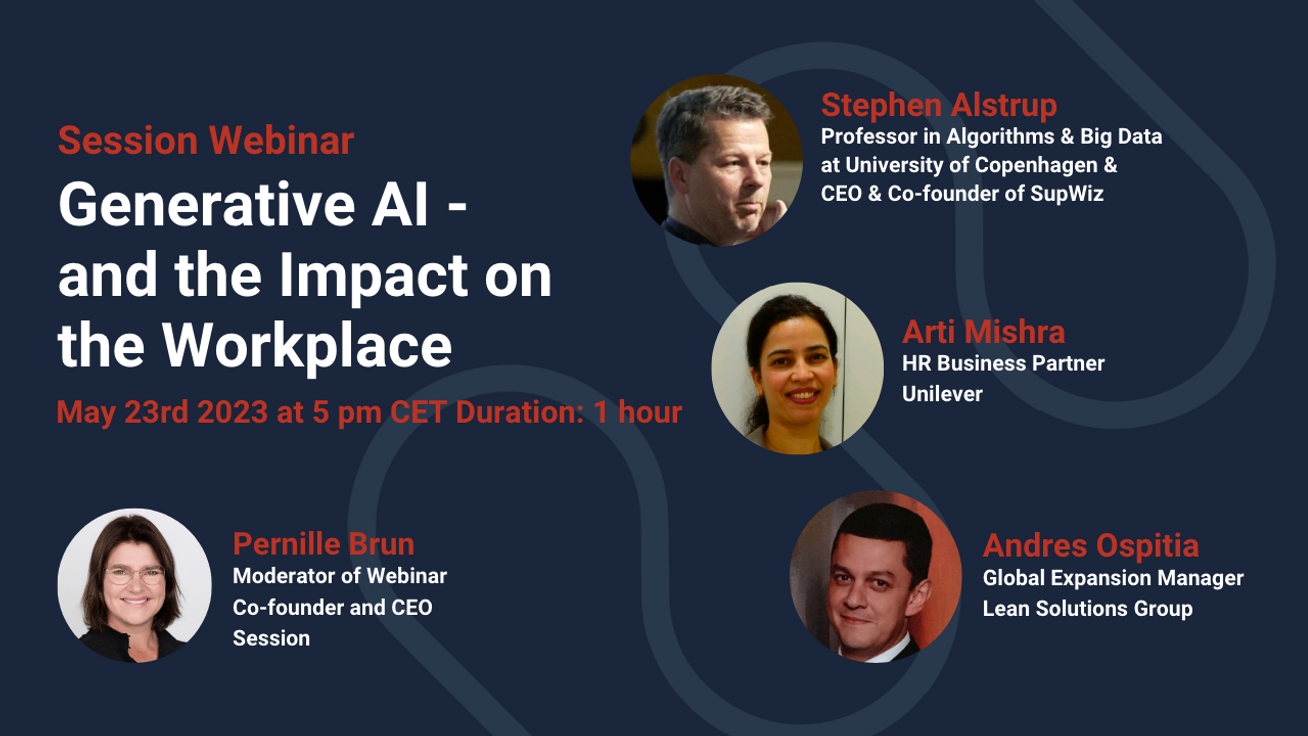As 2021 has come to an end and 2022 is upon us, let’s take a look at the year ahead of us through the lens of HR. 2022 is indeed shaping up to be an incredibly interesting year for HR professionals. Almost two years of a pandemic have brought about unprecedented change, and the question remains: what will happen now? Will organizations revert back to pre-pandemic habits, or will 2022 and beyond be a period of real transformation? We believe that HR departments now have an unprecedented opportunity to truly transform themselves, their organizations, and shape the future of work. While 2021 was a year of reinventing HR and solidifying its new role, 2022 is going to be all about pushing the boundaries of how HR can add value. Let’s take a look at HR trends for 2022.
Trend #1: HR to be Strategically Positioned at the Executive Level
HR should no longer shy away from embracing the superpowers of Technology and Data, giving HR a chance to back initiatives worth pushing for with data and to support and drive HR initiatives with tech-supported solutions. Also, supporting the managers in the organization to benefit from using data to support initiatives, is a key role of HR.
One HR trend we are seeing right now is HR strategically positioning and supporting projects and initiatives which - supported by data - show the greatest ROI for the business. HR always has, and always will aim to provide value. But with data supporting initiatives and behaviors that actually “pay off” for the business to invest in, it is now even more apparent how critical it is that HR gets a seat at the table at the Executive Level - where the decisions, forecastings, and budgets are made.
Trend # 2: HR using Technology as a Force for Good
The sheer power and acceleration of tech is permeating all aspects of our lives and HR is no exception. According to a Sage survey, a staggering 82% of HR leaders said they had to scale HR technology to manage and operate effectively during the pandemic and it empowered HR to manage and navigate disruption. However, like everything else, there is an undeniably dark side to technological advancements within HR practices. Take for example the infamous case of Amazon's biased hiring algorithm that showed discrimination against women in the hiring process, or the more recent example of Uber's facial recognition app feature discriminating against drivers from racial or racial-ethnic underrepresented groups. We are reminded that whenever we use technology, we have a responsibility to use it for good.
HR technology when used as a force for good can be seen in the following:
Artificial intelligence (AI) and machine learning
HR teams are often stretched very thin, and the functions that AI and machine learning can perform can help to conquer repetitive tasks. 2022 will see even greater advances in AI and machine learning. According to Devyani Vaishampayan, director and CEO at The HR Tech Partnership, the future for HR tech will be to enable teams to use AI applications “that are intuitive, improve employee engagement, provide predictive insights to leaders and are cost-effective”, and it should be high on the HR agenda.
As an example, let's take a look at Susan, who is heading up a team out of Brazil. Her team was supported by HR to start using machine learning to track what initiatives gave them the most Return on Investment in terms of effort on sales. When approaching a new customer - what kind of communication would give the best result? And would there be a difference in terms of what kind of customer approached with a specific kind of communication? By using machine learning and tracking data and responses, over time a pattern emerged. It became clear what kind of communication worked with whom, but also another thing became clear: When to send out information, when to approach whom, and how often to contact. This improved sales immensely - to the benefit of the organization, and thanks to HR being proactive in supporting the team with implementing the right technology.
At the same time, the team was also supported to track data on employee engagement. How happy were the team with the communication coming from the leader? What kind of communication worked best? What kind of employee improvement initiatives worked best - was it more frequent and shorter check-ins or longer meetings once a week? Again, instead of judging from the gut - data supported what initiatives worked best. This is the future of HR - to support leaders and teams to make wise decisions based on data rather than “just” a gut feeling.
As described in this article from Workday (referring to a report from IBM), modern HR organizations implement AI and machine learning for five main reasons:
- Solving pressing business challenges
- Attracting and developing new skills
- Improving the employee experience
- Providing strong support for decisions
- Using HR budgets as efficiently as possible
Tech Supporting Well-being
In 2022, HR tech can evolve to accommodate a greater range of well-being resources. Well-being is an increasingly critical focus, considering the impact that the pandemic has had - and continues to have - on people’s mental health. The market for mental health apps is ever-evolving, giving HR an opportunity to offer these to employees at a low cost. Choosing the right one might be a jungle since there are more than 15.000 of them available on the app stores. But it’s worth investigating and getting recommendations from HR colleagues from other companies - and even to check them out yourself. You might find it beneficial to start meditating, or being reminded of your own self-worth and great accomplishments? Just to give you a taste of what the apps can help you and your employees with.
Before the pandemic, companies’ well-being packages were largely seen as an employee perk. However, this has changed significantly as the pandemic has reshuffled employees’ priorities - and workers are demanding more from their work than the 9 to 5 grind. Therefore, HR needs to help the business decide how they want to offer inclusive benefits, holistic employee wellbeing, and mental health support, which might lead to rethinking and overhauling their overall rewards policies.
Devyani Vaishampayan adds that HR tech solutions will also begin to encompass “coaching, mentoring and [will help to create] an inclusive culture linked to organizational purpose”. Coaching and mentoring go beyond the training and reminders, supporting mental health. It also builds up skills, new mindsets, and healthy working habits - all supporting overall mental health. At Session, our coaching solution is online, giving us the opportunity to support the wellbeing and the engagement of your employees by giving them access to great business coaching. Wellbeing and happiness at work is something Session dug deeper into in this article from December 2021 on Happiness at Work.
Technology improving hybrid work teams
It may seem obvious that tech has improved and facilitated hybrid work, however, as organizations move to more and more remote and hybrid work, HR teams must think about the right technology to maximize the potential of hybrid teams and inform and support team-leaders about research within the field, share best practices and then support them in implementing and using the right technology.
Gillian Davis, founder, and CEO at OverTime Leader suggests that in 2022, HR must teach team-leaders “how to balance hybrid working so that those working via a screen don’t feel left out, or at a disadvantage to those in the office”. Next, they must support teams to adapt the technology “to create seamless accessibility and inclusion for onboarding, retention, and development”, especially when it comes to international teams. Finally, HR teams must make sure the team-leads can make “documentation and annotation easy and seamless so that teams get better at capturing and sharing their approaches, ways of working and goals”.
Again, rather than just leaving it up to each individual to find their own way, HR must be proactive in supporting the teams to lead in the best way possible with the best tools and technology that exists. It is the responsibility of HR to share this knowledge, support with data - and teach leaders to lead in the best way with the technology at hand. Also, it is and will be the responsibility of HR to support leaders to be fully digital with teams. Hybrid work, remote work, and working from home, are not things that will “go away”. Even when data shows that in-person meetings in some instances are better than a hybrid, employees will still need to every once in a while to work from home. Giving the employees the possibility to choose for themselves, and supporting them with the right tools, is a great - and needed - retention strategy.
Trend #3: More Importance Placed on DEI Initiatives and Inclusive Benefits
New generations have ushered in a growing interest in DEI (diversity, equity, and inclusion) matters, and companies are following suit. In fact, 76% of employees and job seekers report a diverse workforce as an important factor when evaluating companies and job offers. Organizations are also recognizing the importance of DEI across industries and are DEI a priority - with 79% planning to allocate more budget and resources in 2022. Many researchers have already proved that diverse organizations are more competitive, profitable, and innovative than non-diverse organizations. Traliant's survey highlights the need for organizations to improve communication to keep employees up to date on DEI goals and progress. Most respondents claim they communicate DEI goals and/or progress on a bi-annual basis or annual basis, which is not the level of transparency leaders need to keep employees up-to-date on progress made to push DEI efforts forward. Training is also a key factor in addressing barriers to diversity and inclusion — including unconscious bias and microaggressions — and helping to foster a sense of belonging in the workplace. Therefore, in 2022, HR professionals will need to go beyond annual/bi-annual DEI goals, and instead weave DEI initiatives into the fabric of their organizations - through consistent and transparent communication of progress being made.
They will also need to take a closer look at the incentives - and reward structures of the company. When it comes to inclusive benefits, they are a crucial part of a company’s broader DEI strategy. They specifically focus on the needs of underrepresented groups – something that many organizations have not yet addressed.
Examples of inclusive benefits include:
- Ensuring there are no disparities for race and ethnicity in health care plans.
- Selecting healthcare providers on their culturally and linguistically appropriate care.
- Choosing solutions that address social determinants of health to ensure equitable outcomes.
Trend #4 Career Experiences Rather Than Traditional Career Development as Retention Strategies
The pandemic taught an important lesson: organizations can no longer solely rely on acquiring their talent externally. Alternatively, the rapidly changing labor market has forced them to make better use of the talent they already have - and nurture it accordingly. This is why career experience and development is becoming increasingly important and will continue to do so in 2022 and beyond. Traditional life-long career development programs run by companies like IBM, AT&T, and GE, where talent was identified, developed, and provided the experience needed for career progression within the organization are now becoming increasingly outdated. The new workforce, particularly millennials and gen-Zers, are becoming increasingly less tied to one employer. In fact, on average, people now change jobs every four years. To adjust to these changes, organizations are increasingly investing in employees’ career experiences. The goal is for the organization to expand its capabilities while enriching the employee’s career with new learning opportunities. These career experiences give employees the opportunity to develop transferable skills which will serve them well regardless of which employer or job they may eventually go to. The future of work, above all else, is flexible and ambiguous.
HR will do not only the workforce in their organization but also the business as a whole, a favor in recognizing this shift. Paradoxically enough, while going with this mindset of nurturing the career experience and development, and letting go of “holding on to” employees, but acknowledging that they might want to use their gained skills and strengths outside your organizational setting and maybe even apply them in another company might be exactly what it takes to retain them. This is a topic we will dig further into in our upcoming webinar on Retention, January 12th, 2022. Make sure to register, and if you miss the webinar in real-time, you can catch the recorded version here.
The pandemic has also fundamentally shifted the focus behind why people want to work. Yes, career progression and salaries remain high priorities, but now more than ever we are seeing employees becoming more value-driven than ever before. Employers need to do more to differentiate and create a compelling employer brand. What’s more, long-term incentives that once kept employees climbing the ladder at one specific corporation have lost much of their appeal. Instead, there is more emphasis on flexibility, supporting employees, and creating purpose.
Trend # 5 Preparing For An Unknown Future
The world has become so unpredictable to the extent that what once seemed stable, has now become unreliable. This is why HR must help the business be prepared for more than one possible future - and embrace the unknown. With the possibility of multiple futures on the horizon, HR needs to adopt its own strategy to become adaptive and agile. According to the HR Trend Institute, “Agile HR” refers to:
- a way of working and organizing the HR function that facilitates responsiveness and adaptiveness of activities and structures,
- facilitating the flexibility in matching workforce fluctuations to demand,
- and the way the HR function supports the organization in becoming more responsive and adaptive.
As the workplace continues to adapt to uncertainty, 2022 will for sure reveal the need for more flexibility and agility within HR functions.
Conclusion:
2022 is set to bring about some interesting changes for HR professionals and teams. When HR uses technology for the greater good and uses data to help inform the business about what behavior and initiatives leave the greatest ROI for the business, they ensure themselves a seat at the table at the executive level. This is long overdue and also needed in order to make our organizations future-proof and also more human! Increased DEI strategic initiatives, a greater emphasis on career experiences, and the need for agility and flexibility - are just a few of the trends we are happy to see emerging within HR. We hope that you have found this article informative - and we hope you will be confident in leading the change that 2022 will bring and carry the HR torch with pride - taking your organization to the next level. If you need a sparring partner to support you in your endeavors, feel free to reach out to us. Our L&D and OD professionals are happy to help, as is our pool of highly professional business coaches.











